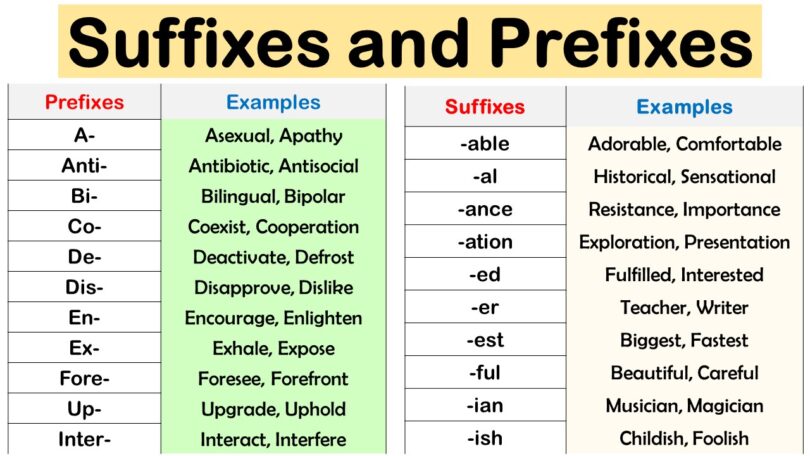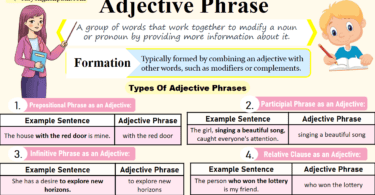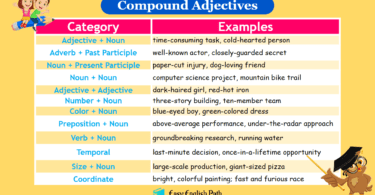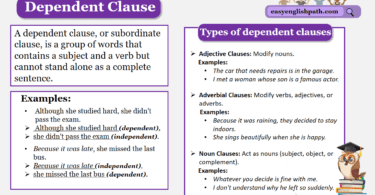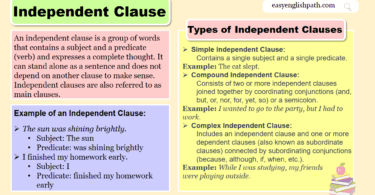Prefixes and suffixes are important parts of English words. A prefix is added at the beginning of a word to change its meaning, like unhappy (un- means “not”). A suffix is added at the end to change its form, like teacher (-er means “a person who teaches”). Learning them helps expand vocabulary and improve communication easily. Let’s discuss them in detail!
What is Prefix and Suffix?
Prefix:
A prefix is a group of letters added at the beginning of a word to change its meaning.
- Unhappy → (un- means not; “unhappy” means not happy).
- Misunderstand → (mis- means wrongly; “misunderstand” means to understand incorrectly).
- Preview → (pre- means before; “preview” means to see before).
Suffix:
A suffix is a group of letters added at the end of a word to change its meaning or grammatical function.
- Careless → (-less means without; “careless” means without care).
- Happiness → (-ness means state of being; “happiness” means the state of being happy).
- Teacher → (-er means a person who does something; “teacher” means a person who teaches).
Spelling Rules to Be Followed When Adding a Prefix or a Suffix
1. Keep the Main Word:
The main word stays the same. For example, ‘happiness‘ is the words that keeps the following word happy as its main word.
2. Change Spelling Sometimes:
Sometimes, you need to change how a word is spelled. Like here ‘dependent‘ is the words which becomes independent when you add IN at the beginning of this word.
3. Double Letters:
If you add a suffix starting with a vowel (like -ing or -ed) to a word ending in one vowel and one consonant, double the last letter.
So, here Stop is a word that becomes Stopped with the addition of ED at the end.
4. Drop Silent E:
If a word has a silent E at the end and you add a suffix starting with a vowel, drop the silent E from the last of this word. For example, the word hope Here turns into —> hoping
5. Change Y to I:
When a word ends in a consonant and ‘y,’ we need to change the Y to I before adding a suffix. Like we we have this word happy it becomes happier. when we change the letter Y to I.
How Prefixes and Suffixes Change Word Meaning
Prefixes are added at the beginning of a word to modify its meaning, often making it the opposite or giving it a new sense.
- Happy → Unhappy (un- means not, so “unhappy” means not happy).
Suffixes are added at the end of a word to change its form, often altering its grammatical role in a sentence. They can turn verbs into nouns, adjectives into adverbs, and more.
- Teach → Teacher (-er means a person who does something, so “teacher” means a person who teaches).
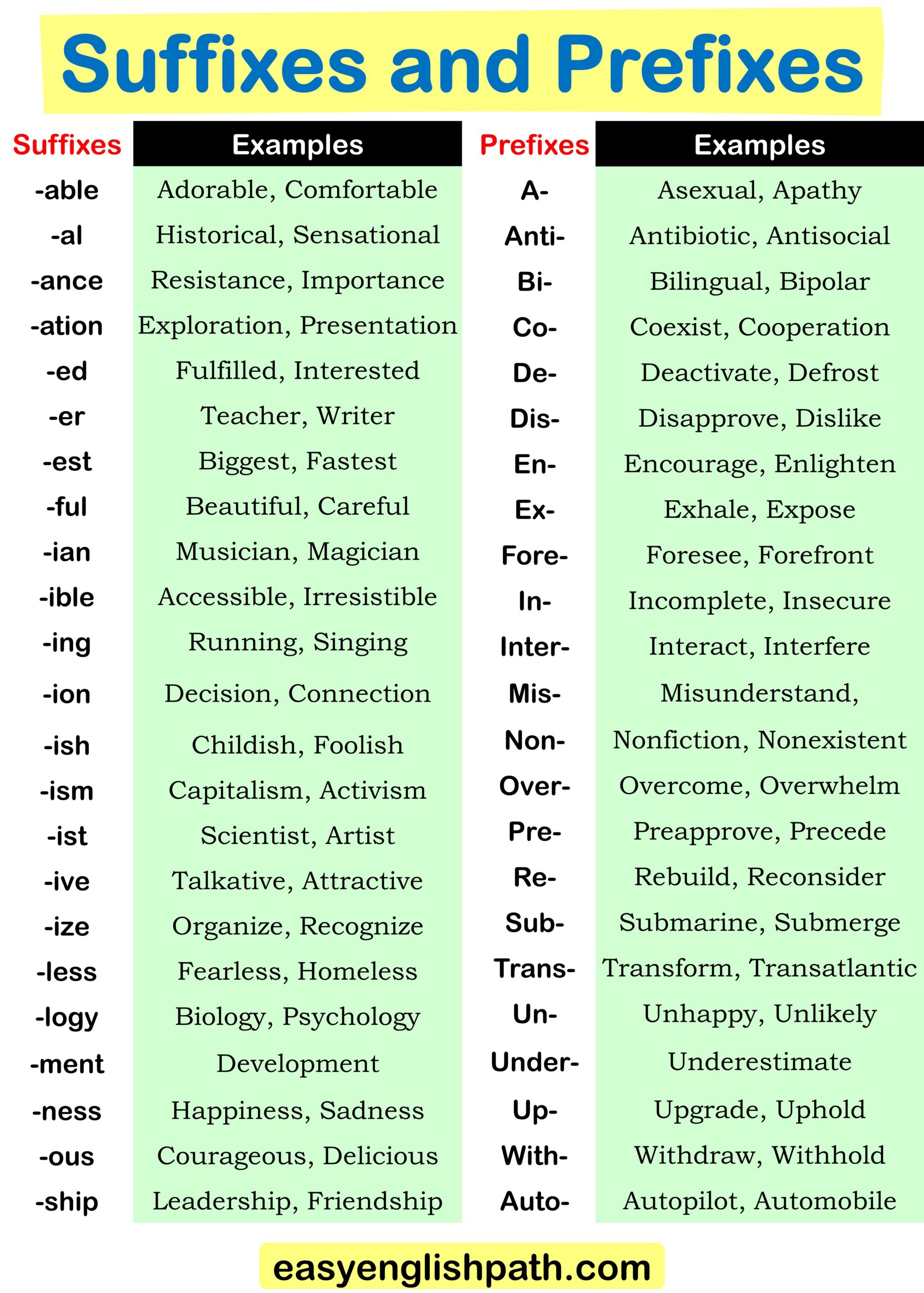
Suffixes and Prefixes Examples
Prefix Examples
| Prefix | Meaning | Example Word | Example Sentence |
|---|---|---|---|
| Inter- | Between | Connect | The bridge helps interconnect the two islands. |
| Intra- | Within | Personal | Intrapersonal skills are essential for self-awareness. |
| Trans- | Across, beyond | Atlantic | The transatlantic flight took several hours. |
| Mal- | Bad, evil | Function | A malfunction indicates a malfunctioning system. |
| En- | Cause to | Rich | Hard work can enrich one’s life. |
| Anti- | Against | Social | She is an antisocial person, preferring solitude. |
| Co- | Together, with | Operate | The team needs to cooperate for success. |
| Hyper- | Over, excessive | Active | An hyperactive child may have difficulty sitting still. |
| Sub- | Under, below | Marine | The submarine explored the depths of the ocean. |
| Pro- | In favor of, supporting | Active | Being proactive is essential for success. |
| Multi- | Many | Cultural | Our society is diverse with a multicultural population. |
| Per- | Through | Spective | The artist used a unique perspective in the painting. |
| Neo- | New, modern | Classical | Neoclassical music combines traditional and modern elements. |
| Circum- | Around | Navigate | Sailors learn to circumnavigate the globe. |
| Anti- | Against | Social | She is an antisocial person, preferring solitude. |
| Auto- | Self | Biography | An autobiography tells one’s life story. |
| Tele- | Distant | Vision | Television brings distant events to our homes. |
| Semi- | Half | Circle | A semicircle has a curved shape like half a circle. |
| Post- | After | War | Postwar reconstruction efforts were significant. |
| Micro- | Small | Organism | A microorganism can only be seen under a microscope. |
| Retro- | Backward, behind | Grade | The school decided to retrograde the student to a lower class. |
| Uni- | One | Verse | The idea of a multiverse challenges the idea of a universe. |
| Over- | Too much, excessive | Achieve | Attempting to overachieve can lead to burnout. |
| Extra- | Beyond, outside | Curricular | The school offers extracurricular activities. |
| Bi- | Two | Weekly | The team has biweekly meetings to discuss progress. |
| Semi- | Half | Circle | A semicircle has a curved shape like half a circle. |
| Dis- | Opposite of | Similar | The two paintings were dissimilar in style. |
| Macro- | Large, long | Economics | Macroeconomics studies the overall economy. |
| Anti- | Against | Inflammatory | The medication has anti-inflammatory properties. |
| Circum- | Around | Navigate | Sailors learn to circumnavigate the globe. |
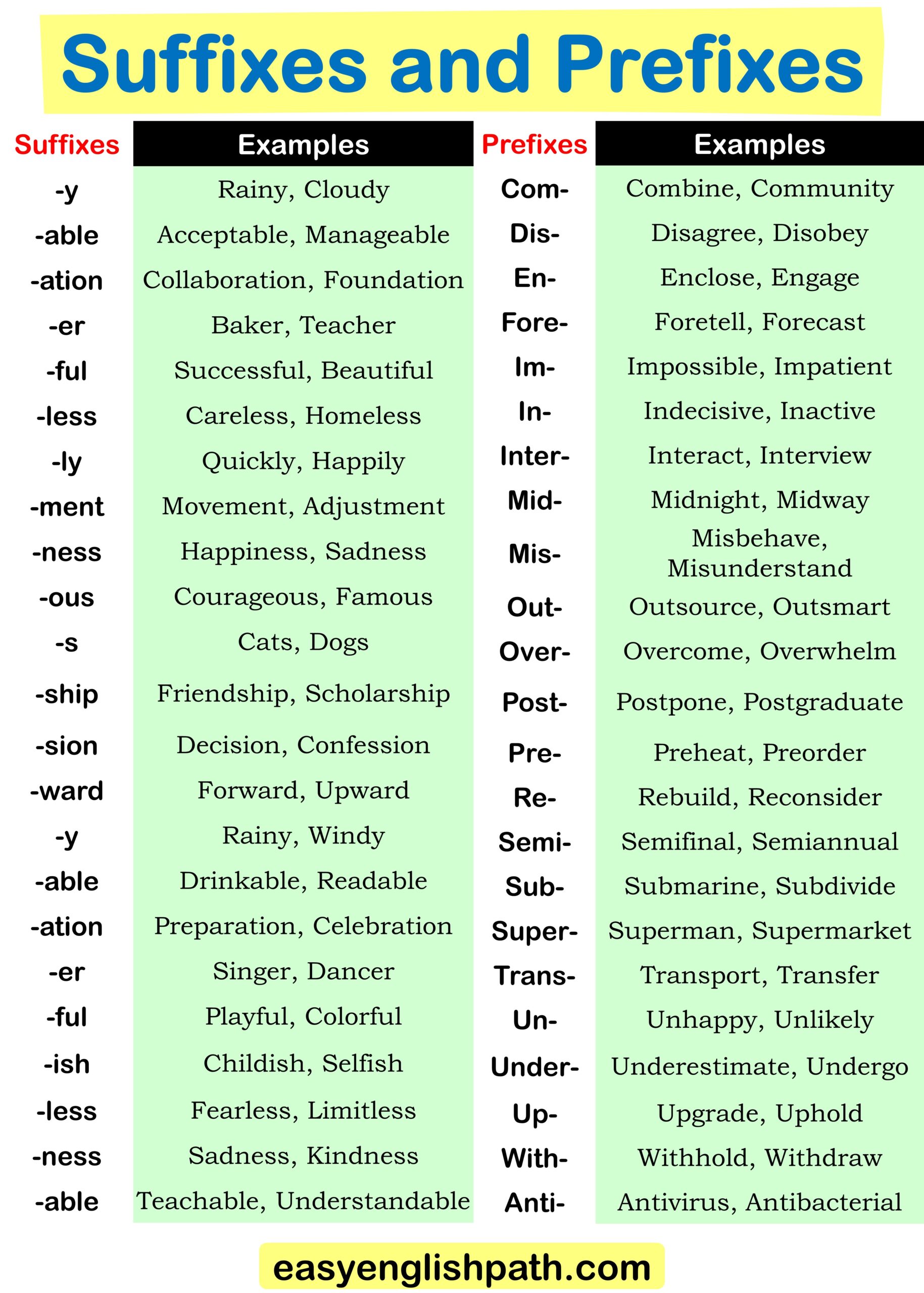
Suffixes Examples
| Suffix | Meaning | Example Word | Example Sentence |
|---|---|---|---|
| -Ary | Relating to | Liter | A book is a literary work of art. |
| -Ous | Having, full of | Marvel | The landscape was marvelous, full of natural wonders. |
| -Ward | Direction, in the direction of | Down | She walked downward towards the valley. |
| -Ful | Full of | Help | The volunteer’s actions were helpful to the community. |
| -Ology | Study of | Biology | Biology is the ology that studies living organisms. |
| -Phobia | Fear of | Arachn | Arachnophobia is the fear of spiders. |
| -Ism | Doctrine, belief | Capital | Capitalism is an economic system based on private ownership. |
| -Eer | Engaged in, associated with | Puppet | A puppeteer is skilled in manipulating puppets during a performance. |
| -Ial | Relating to | Colon | The grammarian explained the correct usage of colial punctuation. |
| -Tion | Act or process of | Educate | The act of educating is called education |
| -Tion | Act or process of | Educate | The act of educating is called education. |
| -Ive | Tending to | Attract | The colorful display is attractive to the audience. |
| -Fy | Make, form into | Terrify | The horror movie will terrify even the bravest viewer. |
| -Ous | Full of, having | Joy | The atmosphere was joyous during the celebration. |
| -Itis | Inflammation of | Tendon | Tendonitis causes pain and swelling in the tendons. |
| -Y | Characterized by | Happ | The child’s laughter sounded happy and carefree. |
| -Ish | Somewhat | Child | The toy was suitable for a childish play. |
| -En | Cause to | Strengthen | Exercise can help enstrengthen your muscles. |
| -Able | Capable of | Depend | Being dependable means being trustable. |
| -Ology | Study of | Psychology | Psychology is the study of the mind |
| -Ish | Somewhat | Fool | His explanation sounded foolish. |
| -Able | Capable of | Understand | With practice, the concept becomes understandable. |
| -Ous | Full of, having | Marvel | The landscape was marvelous, full of natural wonders. |
| -Ive | Tending to | Attract | The new fragrance is designed to attractive. |
| -Ology | Study of | Biology | Biology is the ology that studies living organisms. |
| -Phobia | Fear of | Arachn | Arachnophobia is the fear of spiders. |
| -Ism | Doctrine, belief | Capital | Capitalism is an economic system based on private ownership. |
| -Eer | Engaged in, associated with | Puppet | A puppeteer is skilled in manipulating puppets during a performance. |
| -Ial | Relating to | Colonial | The museum displays artifacts from the colonial period. |
| -Tion | Act or process of | Invent | The invention of the wheel revolutionized transportation. |
Difference Between Prefixes and Suffixes
| Feature | Prefix | Suffix |
|---|---|---|
| Position | Added before the root word | Added after the root word |
| Function | Changes the meaning of the word | Changes the form of the word such as tense or part of speech |
| Example | re in rewrite meaning to write again | er in teacher which changes teach into a noun |
| Effect | Does not usually change the word’s grammatical category | Often changes the word’s grammatical category |
| Common Examples | un, re, pre, mis, dis | ly, ness, ment, ful, able |
Why Learning Prefixes and Suffixes Is Important
Learning prefixes and suffixes makes it easier to understand and use new words. Prefixes change a word’s meaning, while suffixes change how a word is used in a sentence. Knowing them helps with reading, writing, and spelling, making communication clearer and more effective.
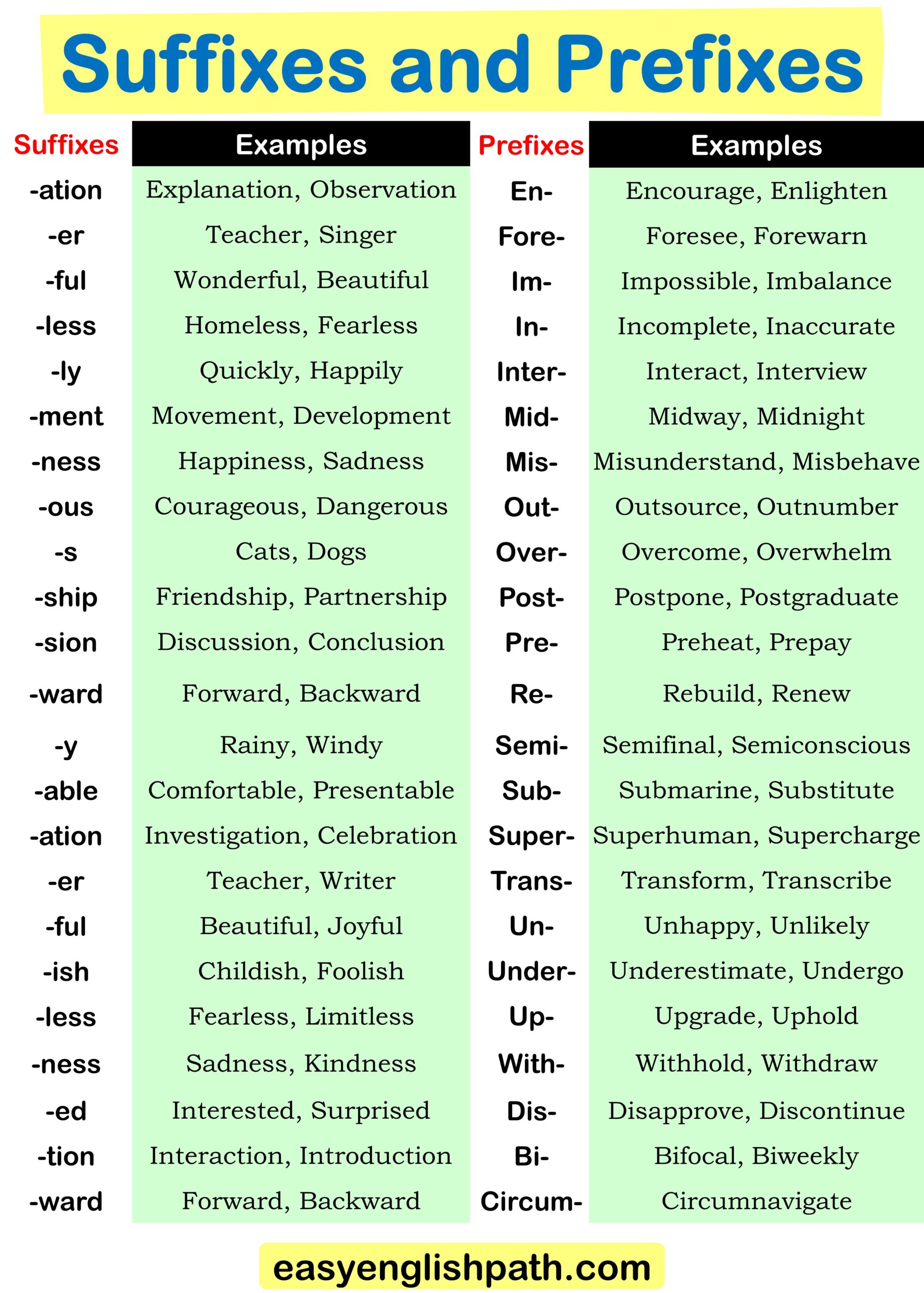
FAQS with Prefixes and Suffixes
1. What is the difference between a prefix and a suffix?
A prefix is added at the beginning of a word (e.g., rewrite), while a suffix is added at the end of a word (e.g., happiness).
2. How do prefixes change a word’s meaning?
Prefixes modify the meaning of a word, often making it opposite or giving it a different sense. Example: honest → dishonest (dis- means “not,” so “dishonest” means “not honest”).
3. How do suffixes affect a word?
Suffixes can change a word’s form or role in a sentence, such as turning a verb into a noun. Example: act → actor (-or means “a person who does something”).
4. Can a word have both a prefix and a suffix?
Yes! Example: unhappily (un- = not, -ly = in a certain manner, so “unhappily” means “in an unhappy way”).
5. Do prefixes and suffixes always change a word’s meaning completely?
Not always! Some only slightly adjust meaning (preheat = heat before, friendship = state of being friends).
You May Also Like

